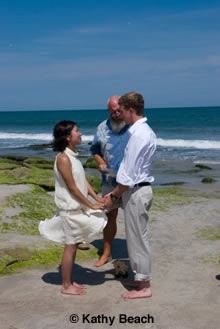
Author’s Note: In my own case, a traditional wedding with planned dates was out of the question. My then fiancée was immigrating from overseas (via the K-1 fiancée visa) and we were given a very finite window of 90 days to have everything completed, from marriage certificate to the start of the paperwork for her permanent residency — the green card. Since this also had an impact on her applying for a working permit, we were both ready to get married and quickly realized the sooner the better, and were prepared to have a city hall “wedding” if we needed to.
While my fiancée was still back in her home country, we considered the idea having a beach wedding. Having already planned a trip to the beach with my family and fiancée, we made some phone calls and soon found a very nice couple to work with: Mr. and Mrs. Beach (I am not making that up — they had their names legally changed), who do the officiating and photography, respectively, and have years of experiencing working up and down the east coast of North Carolina. They recommended a secluded spot for us known for its accessibility, tranquility, and beautiful moss covered rocks. We sent in our deposit and set our date, and had a wonderful wedding.
Indeed, my case is probably not typical, but I am also willing to guess that everyone's cases are unique. The following are some points I found worthy of sharing, because when it comes to planning a wedding, making it your own is of absolute essence!
For some people, a traditional wedding just doesn’t work. The planning involved may be too much; in some cases, the timing might not allow for all the pieces that need to fall in place for a proper wedding. When this happens, the eloping couple tends to look elsewhere for places to get married quickly. One popular place is to head for shore — the beach wedding.
Beach weddings have several advantages over traditional weddings that make them worth considering. Of course, there are a couple of drawbacks, which are also pointed out below.
First and foremost, by their very nature, beach weddings incorporate natural elements of life — wind, water, and earth, sun (some folks may even add fire!) — as well as abstract concepts like timelessness, cleansing, and tranquility.
Secondly, planning a beach wedding can be done on much shorter notice than a traditional wedding may require. Obviously, this depends on a number of factors, such as how many guests will attend, and whether a reception will be held following the ceremony.
Thirdly, it’s the beach! Beaches are known for their visual and aural awesomeness. This translates to some excellent photo opportunities and natural relaxation. Hearing the “I do”s exchanged with the gentle crashing of the waves in the background is awe inspiring to say the least.
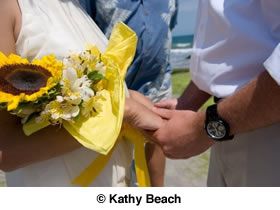
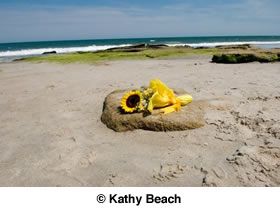
There are probably other reasons why you’d want to have a beach wedding. Everyone has their reasons — the important part is making sure it's what you want.
Now that you’re thinking about having a beach wedding, ask yourself a simple question: why would you not have one?
Well, for one, nature is unpredictable. Most beach locations are ad hoc in that people show up, and walk out to a spot in the sand or rocks. So if a storm comes rolling in last minute, there’s very little you can do short of waiting it out or trying to reschedule.
You might also face transportation and accessibility concerns. Part of the charm of beach weddings is that they are located in secluded areas. That’s fine for a small gathering, but assembling a large crowd there may turn into a larger logistical feat than previously imagined.
As long as these concerns are ok with you and your soon-to-be-spouse, then you should be good to go.
Choosing a Location
OK, so you’ve decided to have a beach wedding — so what do you do about the location? You’ll probably want to have something that has some points of interest in the landscape. Grasses and rocks serve as excellent backdrops in the photography, and may offer some advantages in helping define the space. Boardwalks, fences, and even houses may also play a role, depending on location.
One key advantage of having all the natural beauty is that it also helps ease the budget on floral purchases. Let nature do the work for you, and concern yourself with only the necessities.

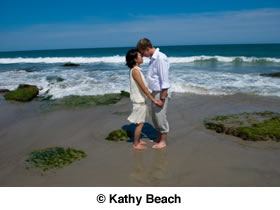
Also, a more private location with fewer beach dwellers is generally preferred to a packed beach. Not only does this cut down on the number of potential interruptions you could face, but it also brings out the natural sounds: the soothing crashing of the waves, the blowing breeze, and maybe even some chirping gulls soaring by.
The difficult part is finding a place when you don’t live near the beach. If you don’t have the luxury of scouting out a spot first, ask around. Wedding arranger/officiants should be able to help recommend places, and can also help inform what, if any, precautions are necessary (which I list below).
Precautions
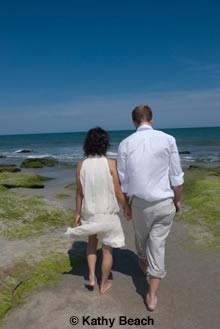
Check the local beach rules. Some beaches have very specific rules on where and when weddings can occur, and require a permit, which you can obtain at the city hall. Other beaches may be strictly forbidden. Generally speaking, the less populated beaches are what you want, as it cuts down on unwanted guests, and also adds a sense of privacy to the ceremony. Try searching online with the terms “beach wedding [NAME OF STATE]” to get an idea of what beaches might be available, and which ones to steer clear of.
Parking is also something to take into consideration, and can vary greatly from beach to beach. Make sure that attendees park their cars in a safe place that won’t get ticketed or towed. This is another great topic you will want to discuss with your officiant.
Good luck in your search for a beach wedding location. May nature help you make it a pleasurable and memorable experience!
Resources
You can learn how to becomde a wedding planner by signing up for a course with NYIAD today!







